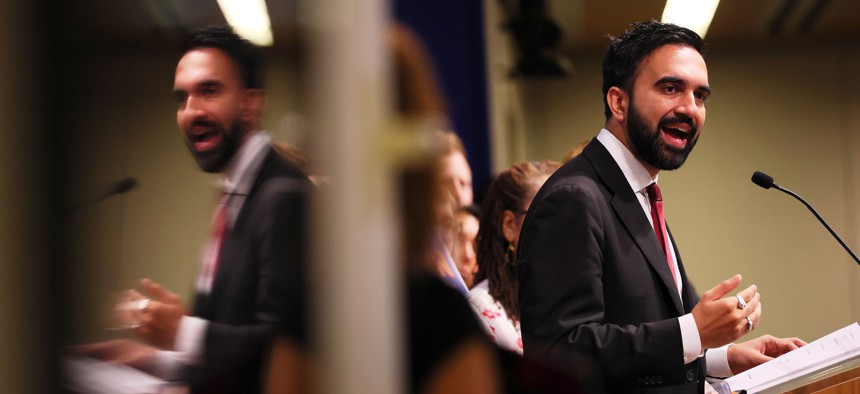New York has long been the second Jerusalem. It isn’t just a city with a large Jewish population. It has been, for more than a century, a symbol of Jewish flourishing, memory, and contribution to the American dream. The recent rise of Zohran Mamdani, a radical socialist with troubling ties to anti-Israel ideology, should shock us into asking a painful but necessary question: what has happened to the soul of the Democratic Party?
20% of Jewish Democrats (and Bernie Sanders) cast their vote for a man who refused to condemn the chant “Globalize the Intifada”, supports boycotts and divestment against Israel beyond wartime, and treats private wealth as a societal disease. This isn’t political apathy but cultural amnesia. Mamdani’s primary victory isn’t a political fluke, but the symptom of deeper philosophical and moral collapse. Remember: “He who does not understand the past is condemned to repeat it. Today, many do not even remember yesterday.”
Enjoy independent, ad-free journalism - delivered to your inbox each week
Demonization, delegitimization, and double standards
Radical leftism today wears the mask of compassion. But as the Hungarian philosopher Ágnes Heller wrote, “the more abstract a universalist morality becomes, the more it feeds totalitarian instincts.” What begins as concern for the oppressed ends in contempt for those seen as powerful, independent, or successful. In practice, this means hard-working people such as Jewish New Yorkers.
Mamdani is part of a movement that reduces human complexity to a single brutal axis, namely oppressor versus oppressed. In this worldview, Jews — once seen as victims of genocide — have been reassigned the role of colonizers, capitalists, and even agents of whiteness.
This isn’t new. Natan Sharansky, the Soviet dissident who warned the West about ideological blindness, identified three markers of modern antisemitism: demonization, delegitimization, and double standards. Mamdani’s record fails all three tests. He supports economic warfare against the only Jewish state. He excuses or ignores inflammatory language about Jews. He aligns with movements that openly call for the destruction of Israel. Selective, utopian, and oblivious to history, ladies and gentlemen, the ‘holy’ war, indeed.

Pictured above: Zohran Mamdani engaged in a debate.
Every utopia begins with promises of justice and ends in tyranny
Let us not be fooled by Mamdani’s polished credentials or his artistic upbringing. His worldview is a crude revival of early 20th-century Leninism, updated with the vocabulary of modern identity politics. The Polish philosopher Leszek Kołakowski, who chronicled the intellectual implosion of the left in his magnum opus Main Currents of Marxism, described every utopia as beginning with promises of justice but ending in tyranny. Mamdani’s proposals, namely state-run grocery stores, racialized tax redistribution, and centralized control over private industry, are symptoms of an ideological mind intoxicated by abstraction. He wants to re-engineer reality, and the whole world is watching. His vision has more in common with what Jan Patočka called “the solidarity of the shaken”: a vision born not out of clarity but out of resentment. His politics is not anchored in citizenship, but in struggle.
Cultural decay of democratic societies
That one in five Jewish Democrats in New York supported Mamdani is tragic, revealing a failure of education, memory, and vigilance. Jewish identity in America, in certain circles, has become dangerously hollow – more cultural than covenantal.
Emil Fackenheim, the Jewish theologian and Holocaust survivor, warned that the greatest threat facing Jews in the modern age was the temptation to forget Auschwitz and the fragility of civilization. Or that radical ideologies often dress themselves in the language of social justice before turning their fury against the very people who welcomed them.
This is a warning echoed in the writings of the Spanish philosopher José Ortega y Gasset, who in The Revolt of the Masses foresaw the cultural decay of democratic societies that abandon their spiritual elites in favor of mass movements. What we are seeing in New York is the substitution of slogans for wisdom, and resentment for responsibility.
Even thinkers within the Jewish tradition like David Novak have stressed that covenantal ethics must take precedence over political fashions. A Judaism without boundaries, seriousness, or self-protection, becomes a tool in other people’s revolutions. And let us not forget Yoram Hazony’s insight: that national identity and Jewish survival aren’t opposites, but intertwined. A universalist left that scorns boundaries, civilizations, and moral limits cannot serve as the guardian of Jewish continuity – something New York has promised to be for so long.
A universalist left that scorns boundaries, civilizations, and moral limits cannot serve as the guardian of Jewish continuity – something New York has promised to be for so long.
Voters in New York can still remember what matters
New York is a mirror, and right now it reflects a culture that’s about to turn on itself. The election of Zohran Mamdani isn’t the cause of this crisis, but the consequence of a society that confuses activism with ethics, slogans with meaning, and rebellion with virtue. But it is not too late. Voters in New York can still remember what matters. They can still defend the values that made New York a place of refuge, not of danger, for Jews and other minorities.
Help Ensure our Survival
New York must recover the clarity of acceptance that it carried for centuries. Today, that would mean a liberalism that defends individual rights, tolerates disagreement, and never trades away its people for political convenience. New York’s Jewish community mustn’t sleep through this moment. The rest of the world dealing with the same fight for a value system that takes centuries to build and minutes to destroy shouldn’t either.




Comments (1)
Only supporting or founding members can comment on our articles.